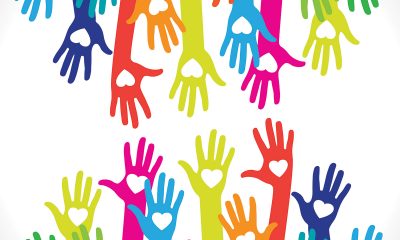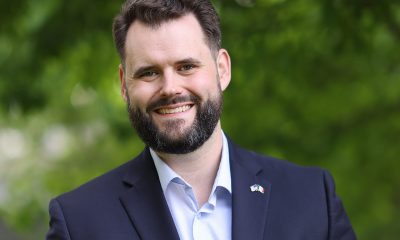World
Report documents anti-LGBT discrimination, violence in Africa
Amnesty International highlights abuses ahead of Obama’s trip to continent
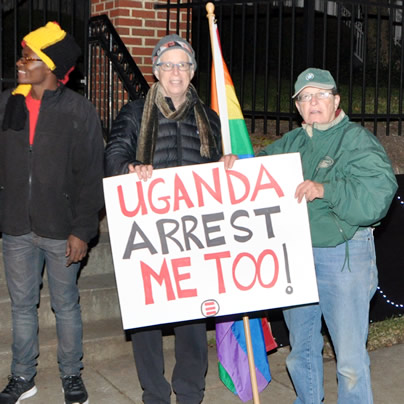
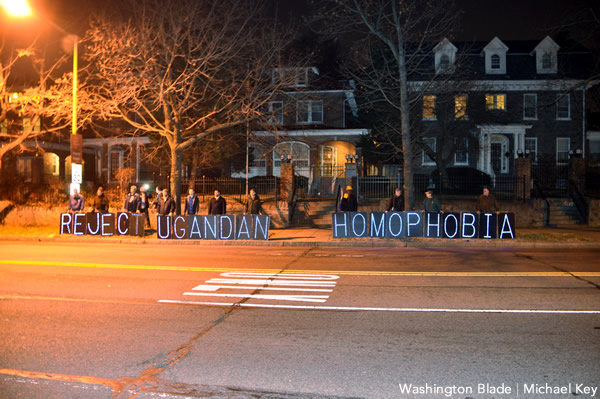
Protesters gather outside the Ugandan embassy in Northwest D.C. in December 2012 to protest the country’s “Kill the Gays” bill. (Washington Blade photo by Michael Key)
The report — “Making Love a Crime: Criminalization of Same-Sex Conduct in Sub-Saharan Africa — notes 38 African countries continue to criminalize consensual same-sex conduct. These include South Sudan, Liberia and Burundi.
The Nigeria House of Representatives late last month passed a measure that would criminalize what Reuters described as same-sex “amorous relationships” and marriages and memberships in a gay rights group. Those convicted under the proposal that President Goodluck Jonathan has yet to sign into law would face up to 14 years in prison.
Mauritania, Sudan and portions of northern Nigeria and Sudan impose the death penalty upon anyone found guilty of consensual same-sex sexual acts. Ugandan lawmakers have faced criticism over the so-called “Kill the Gays” bill that would impose the death penalty upon anyone convicted of repeated same-sex sexual acts.
The Amnesty International report further notes at least seven LGBT South Africans were murdered between June-Nov. 2012 because of their sexual orientation or gender identity and expression.
It also documents police officers in Cameroon who subjected those they detained under the country’s anti-homosexuality law to forced anal exams. Michel Togué, a lawyer who advocates on behalf of gay Cameroonians, discussed these and other human rights abuses during an interview with the Washington Blade earlier this year in D.C.
“Gay people are not seeking everyone to approve of their behavior,” he said. “They are seeking freedom.”
Widney Brown, director of law and policy for Amnesty International, stressed African governments have a responsibility to protect the rights of their LGBT citizens.
“These attacks — sometimes deadly — must be stopped,” Brown said. “No one should be beaten or killed because of who they are attracted to or intimately involved with.”
Amnesty International released its report less than two days before President Obama is scheduled to leave D.C. for a week-long trip to Africa that will include stops in Senegal, South Africa and Tanzania.
The White House and the State Department have repeatedly spoken out against Uganda’s anti-homosexuality bill.
Secretary of State John Kerry last week responded to a question during Gays and Lesbians in Foreign Affairs Agencies (GLIFAA)’s annual Pride event in Foggy Bottom about “a marked increase in anti-gay legislation and homophobic statements” by government officials and religious leaders in Nigeria, Uganda and other countries. The State Department in August 2012 criticized the Zimbabwean government after police arrested dozens of activists inside the offices of Gays and Lesbians of Zimbabwe (GALZ,) an LGBT rights organization, in Harare, the country’s capital.
“When they raid our offices they think they are going to find pornographic materials,” a GALZ member told the Blade during an exclusive interview earlier this year in D.C. “When they come in there, they find it is a resource center. People are busy working.”
The Obama administration and British Prime Minister David Cameron have both suggested the allocation of international aid should hinge upon a country’s record on LGBT rights.
Amnesty International cites progress on LGBT issues in Africa
In spite of the continued human rights abuses against LGBT Africans, Amnesty International’s report notes progress in many countries across the continent.
Cape Verde, Mauritius, São Tomé and Príncipe and the Seychelles have decriminalized homosexuality over the last decade. Botswana and Mozambique are among the African countries that have banned anti-gay employment discrimination in recent years.
Same-sex couples have been able to marry in South Africa since 2006.
African countries have responsibility to ‘protect, not prosecute’
The Amnesty International report contains a number of recommendations on how it feels African governments can eliminate discrimination and violence against their LGBT citizens. These include repealing laws that criminalize or “otherwise impose punitive sanctions on consensual same-sex conduct,” abolishing the death penalty and eliminating anti-LGBT discrimination in the judicial system.
“As the chorus for recognition grows stronger and stronger, African states have to stop denying that homophobia is a human rights issue and recognize that LGBTI rights are an integral part of the human rights struggle,” Brown said. “It is their responsibility to protect, not persecute.”
Congress
McBride, other US lawmakers travel to Denmark
Trump’s demand for Greenland’s annexation overshadowed trip

Delaware Congresswoman Sarah McBride is among the 11 members of Congress who traveled to Denmark over the past weekend amid President Donald Trump’s continued calls for the U.S. to take control of Greenland.
McBride, the first openly transgender person elected to Congress, traveled to Copenhagen, the Danish capital, with U.S. Sens. Chris Coons (D-Del.), Thom Tillis (R-N.C.), Jeanne Shaheen (D-N.H.), Dick Durbin (D-Ill.), and Lisa Murkowski (R-Alaska) and U.S. Reps. Steny Hoyer (D-Md.), Gregory Meeks (D-N.Y.), Madeleine Dean (D-Pa.), Don Bacon (R-Neb.), and Sarah Jacobs (D-Calif.). The lawmakers met with Danish Prime Minister Mette Frederiksen and Greenlandic MP Pipaluk Lynge, among others.
“I’m grateful to Sen. Coons for his leadership in bringing together a bipartisan, bicameral delegation to reaffirm our support in Congress for our NATO ally, Denmark,” said McBride in a press release that detailed the trip. “Delaware understands that our security and prosperity depend on strong partnerships rooted in mutual respect, sovereignty, and self-determination. At a time of growing global instability, this trip could not be more poignant.”
Greenland is a self-governing territory of Denmark with a population of less than 60,000 people. Trump maintains the U.S. needs to control the mineral-rich island in the Arctic Ocean between Europe and North America because of national security.
The Associated Press notes thousands of people on Saturday in Nuuk, the Greenlandic capital, protested against Trump. British Prime Minister Keir Starmer is among those who have criticized Trump over his suggestion the U.S. would impose tariffs against countries that do not support U.S. annexation of Greenland.
A poll that Sermitsiaq, a Greenlandic newspaper, and Berlingske, a Danish newspaper, commissioned last January indicates 85 percent do not want Greenland to become part of the U.S. The pro-independence Demokraatit party won parliamentary elections that took place on March 12, 2025.
“At this critical juncture for our countries, our message was clear as members of Congress: we value the U.S.-Denmark partnership, the NATO alliance, and the right of Greenlanders to self-determination,” said McBride on Sunday in a Facebook post that contained pictures of her and her fellow lawmakers meeting with their Danish and Greenlandic counterparts.
Colombia
Gay Venezuelan opposition leader: Country’s future uncertain after Maduro ouster
Yendri Rodríguez fled to Colombia in 2024 after authorities ‘arbitrarily detained’ him

A gay Venezuelan opposition leader who currently lives in Colombia says his country’s future is uncertain in the wake of now former President Nicolás Maduro’s ouster.
The Washington Blade spoke with Yendri Rodríguez on Thursday, 12 days after American forces seized Maduro and his wife, Cilia Flores, at their home in Caracas, the Venezuelan capital, during an overnight operation.
Maduro and Flores on Jan. 5 pleaded not guilty to federal drug charges in New York. The Venezuelan National Assembly the day before swore in Delcy Rodríguez, who was Maduro’s vice president, as the country’s acting president.
Rodríguez, who lives in the Colombian capital of Bogotá, described the events surrounding Maduro’s ouster as “very confusing.”
“It was a very surprising thing that left me in shock,” Rodríguez told the Blade. “We also thought, at least from the perspective of human rights, that the United States was going to respect international law and not go to the extreme of bombing and extracting Maduro.”
“Other questions also arise,” he added. “What could have been done? What else could have been done to avoid reaching this point? That is the biggest question posed to the international community, to other countries, to the human rights mechanisms we established before Trump violated international law, precisely to preserve these mechanisms and protect the human rights of Venezuelan people and those of us who have been forced to flee.”
Rodríguez three years ago founded the Venezuelan Observatory of LGBTIQ+ Violence. He also worked with Tamara Adrián, a lawyer who in 2015 became the first openly transgender woman elected to the Venezuelan National Assembly, for more than a decade.
Members of Venezuela’s military counterintelligence agency, known by the Spanish acronym DGCIM, on Aug. 3, 2024, “arbitrarily detained” Rodríguez as he was trying to leave the country to attend a U.N. human rights event in Geneva.
Rodríguez told the Blade he was “forcibly disappeared” for nearly nine hours and suffered “psychological torture.” He fled to Colombia upon his release.
Two men on Oct. 14, 2025, shot Rodríguez and Luis Peche Arteaga, a Venezuelan political consultant, as they left a Bogotá building.
The assailants shot Rodríguez eight times, leaving him with a fractured arm and hip. Rodríguez told the Blade he has undergone multiple surgeries and has had to learn how to walk again.
“This recovery has been quite fast, better than we expected, but I still need to finish the healing process for a fractured arm and complete the physical therapy for the hip replacement I had to undergo as a result of these gunshots,” he said.

María Corina Machado, who won the 2025 Nobel Peace Prize, and other Venezuelan opposition leaders said Maduro’s government targeted Rodríguez and Peche. Colombian President Gustavo Petro and his government also condemned the attack.
Colombian authorities have yet to arrest anyone in connection with the attack.
Rodríguez noted to the Blade he couldn’t sleep on Jan. 3 because “of the aches and pains” from the shooting. He said a friend who is “helping me out and looking after my things” was the one who told him about the operation the U.S. carried out to seize Maduro and Flores.
“He said, ‘Look at this! They’re bombing Caracas! And I was like, ‘What is this?'” recalled Rodríguez.
White House ‘not necessarily’ promoting human rights agenda
Rodríguez noted Delcy Rodríguez “is and forms part of the mechanisms of repression” that includes DGCIM and other “repressive state forces that have not only repressed, but also tortured, imprisoned, and disappeared people simply for defending the right to vote in (the) 2024 (election), simply for protesting, simply for accompanying family members.” Yendri Rodríguez told the Blade that “there isn’t much hope that things will change” in Venezuela with Delcy Rodríguez as president.
“Let’s hope that countries and the international community can establish the necessary dialogues, with the necessary intervention and pressure, diplomatically, with this interim government,” said Yendri Rodríguez, who noted hundreds of political prisoners remain in custody.
He told the Blade the Trump-Vance administration does not “not necessarily” have “an agenda committed to human rights. And we’ve seen this in their actions domestically, but also in their dealings with other countries.”
“Our hope is that the rest of the international community, more than the U.S. government, will take action,” said Yendri Rodríguez. “This is a crucial moment to preserve democratic institutions worldwide, to preserve human rights.”
Yendri Rodríguez specifically urged the European Union, Colombia, Brazil, and other Latin American countries “to stop turning a blind eye to what is happening and to establish bridges and channels of communication that guarantee a human rights agenda” and to try “to curb the military advances that the United States may still be considering.”

Yendri Rodríguez told the Blade he also plans to return to Venezuela when it is safe for him to do so.
“My plan will always be to return to Venezuela, at least when it’s no longer a risk,” he said. “The conditions aren’t right for me to return because this interim government is a continuation of Maduro’s government.”
Editor’s note: International News Editor Michael K. Lavers was on assignment in Bogotá, Colombia, from Jan. 5-10.
Iran
Grenell: ‘Real hope’ for gay rights in Iran as result of nationwide protests
Former ambassador to Germany claimed he has sneaked ‘gays and lesbians out of’ country

Richard Grenell, the presidential envoy for special missions of the United States, said on X on Tuesday that he has helped “sneak gays and lesbians out of Iran” and is seeing a change in attitudes in the country.
The post, which now has more than 25,000 likes since its uploading, claims that attitudes toward gays and lesbians are shifting amid massive economic protests across the country.
“For the first time EVER, someone has said ‘I want to wait just a bit,” the former U.S. ambassador to Germany wrote. “There is real hope coming from the inside. I don’t think you can stop this now.”
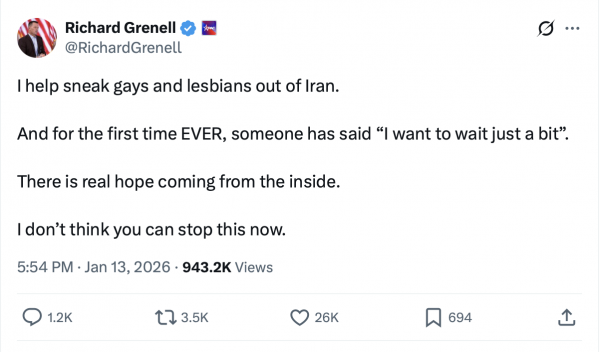
Grenell has been a longtime supporter of the president.
“Richard Grenell is a fabulous person, A STAR,” Trump posted on Truth Social days before his official appointment to the ambassador role. “He will be someplace, high up! DJT”
Iran, which is experiencing demonstrations across all 31 provinces of the country — including in Tehran, the capital — started as a result of a financial crisis causing the collapse of its national currency. Time magazine credits this uprising after the U.N. re-imposed sanctions in September over the country’s pursuit of nuclear weapons.
As basic necessities like bread, rice, meat, and medical supplies become increasingly unaffordable to the majority of the more than 90 million people living there, citizens took to the streets to push back against Iran’s theocratic regime.
Grenell, who was made president and executive director of the John F. Kennedy Center for the Performing Arts last year by Trump, believes that people in the majority Shiite Muslim country are also beginning to protest human rights abuses.
Iran is among only a handful of countries in which consensual same-sex sexual relations remain punishable by death, according to the Death Penalty Information Center.


